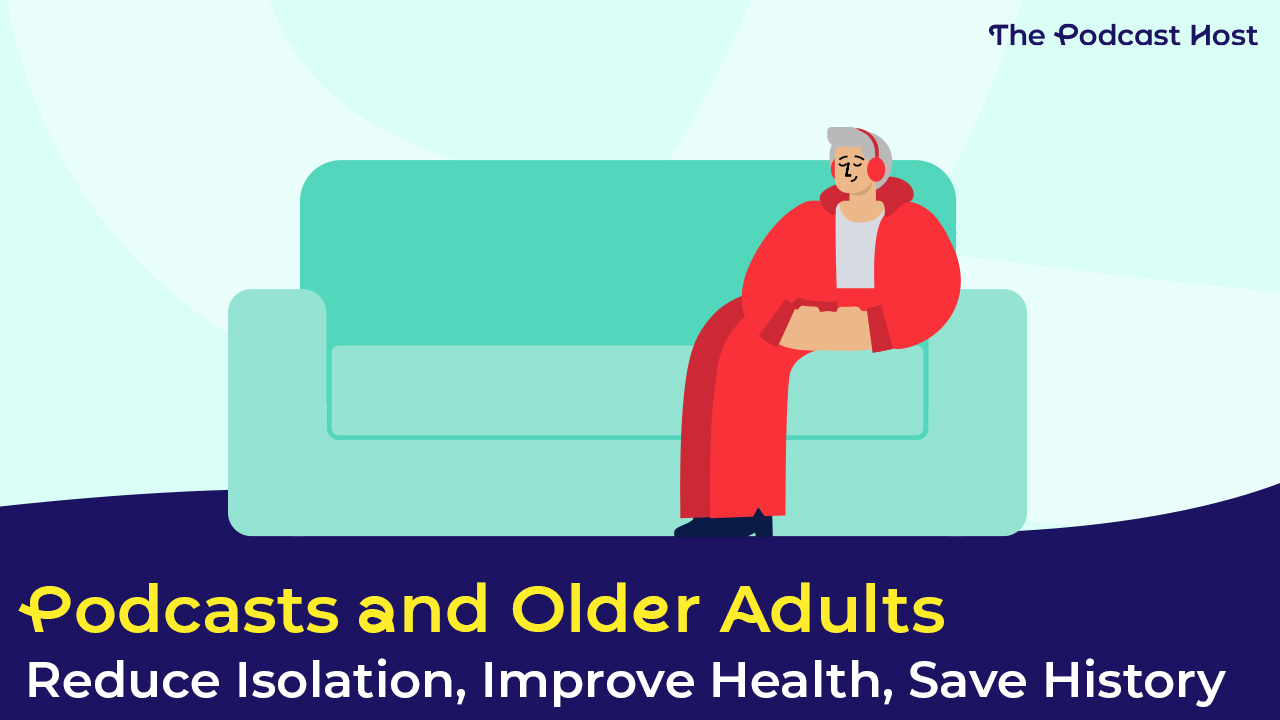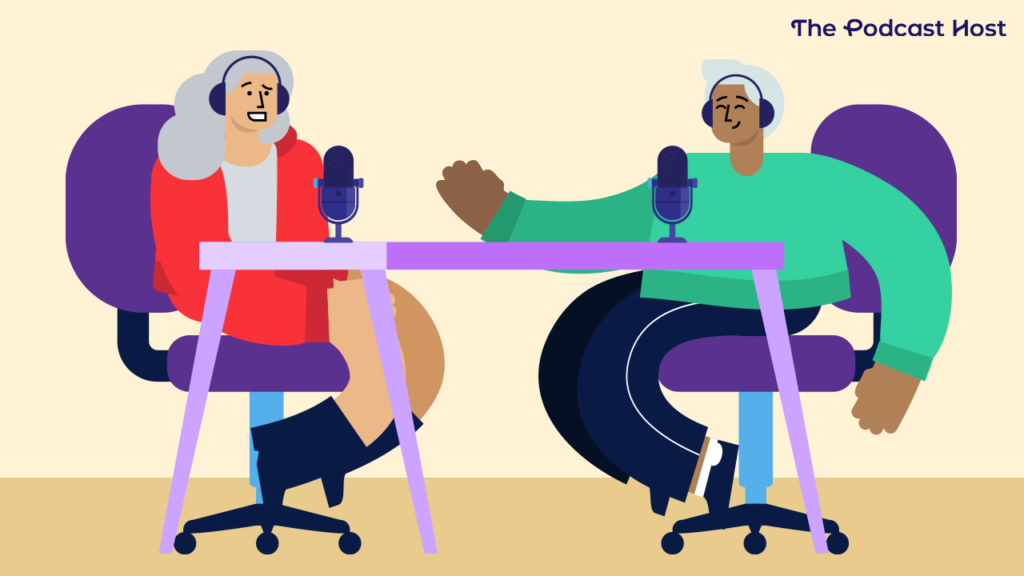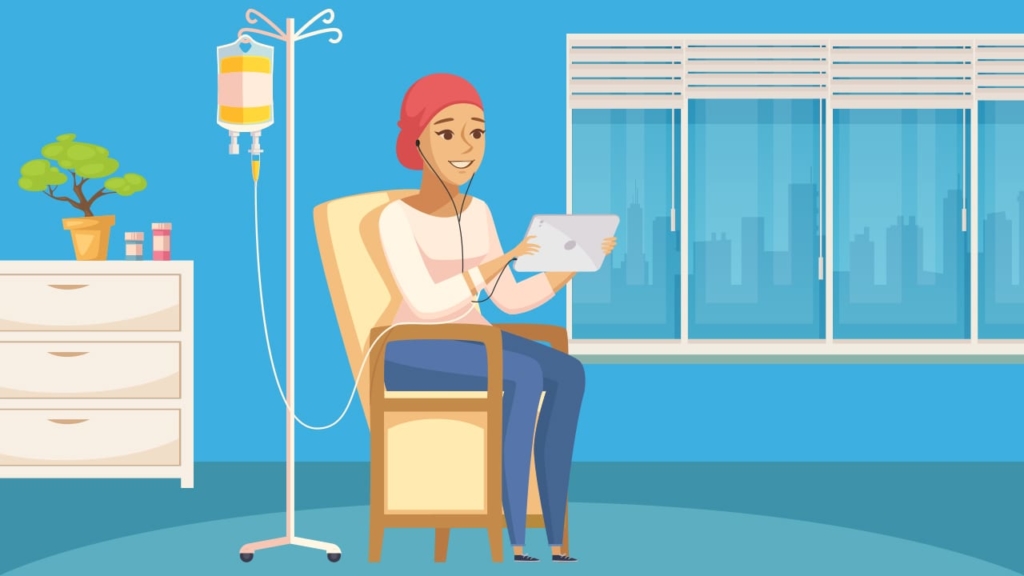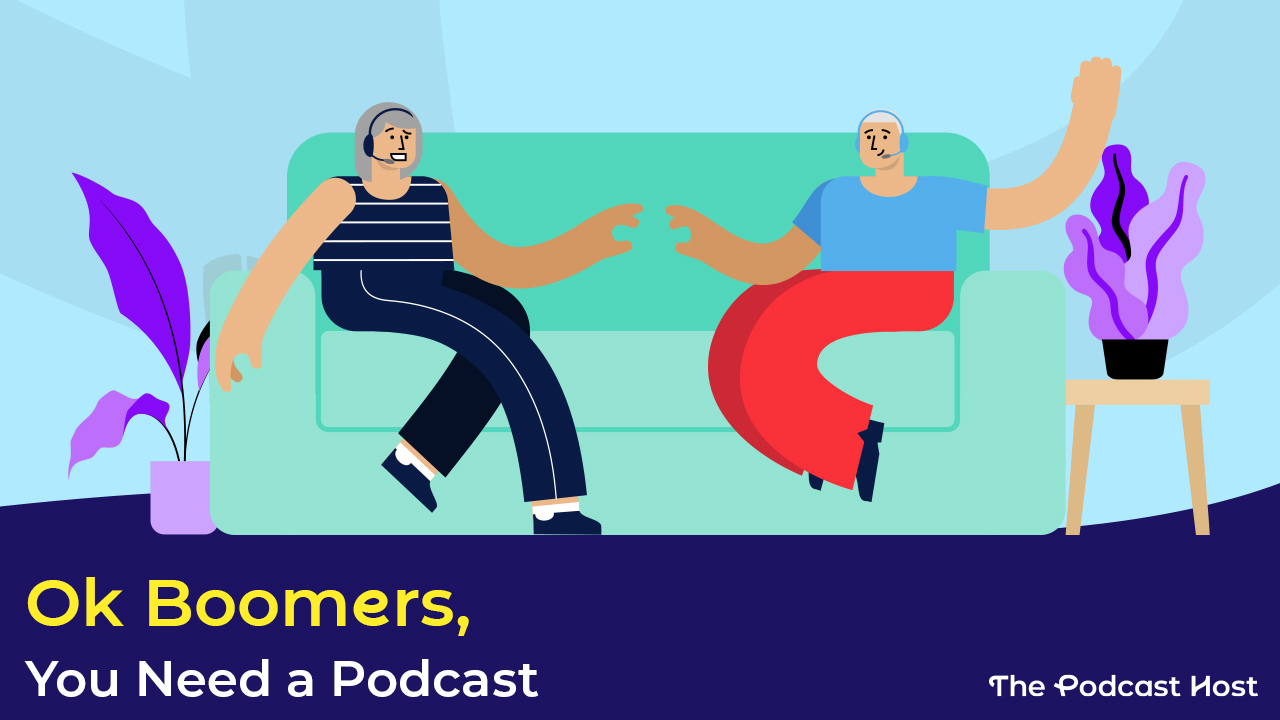Podcasts and Older Adults: Reduce Isolation, Improve Health, Save History

Recent studies show that, apparently, only 2% of podcasters are 55 years old or older. I find this a bit hard to believe. Carrie analyzed this thoroughly in her recent article, Okay Boomer, You Need a Podcast, and it’s been living rent-free in my head. Not only do more people over age 55 need to make podcasts, but we need to share podcasts with older adults to improve our community’s health.
Carrie’s point is that people over 55 (or “older adults”) are excluded from podcasting by a negative feedback loop. “Because listeners fifty-five and older don’t hear creators in their age range, they aren’t inspired to become podcast creators. Yet, because Boomer voices are absent from podcasting, Boomers are less likely to consume podcast content regularly.” The Infinite Dial 2022 report says that 22% of this group listens to podcasts monthly.
If podcasters wonder why their show’s audience isn’t growing, maybe it’s because they ignored a population.
Older Adults Have Solid Listening Habits
Older adults didn’t just grow up with radio. They made radio big. In the US, people who came of age before radio de-regulation enjoyed a wider variety of radio stations, shows, and genres than they do now. Sports games turned commentators’ style into a kind of music all its own. Music requests were fuel for drama.
Radio was social media for people born before 1990. Unfortunately, radio became so big that a handful of companies wanted all of it for themselves, and you know how those stories go. For older adults, listening to chat shows, music, drama, or games, whether in the background or center stage, is part of life. Radio doesn’t have that diversity of content anymore. Podcasting, however, does. Older adults are used to listening to audio drama, news, sermons, music, and commentary. Your podcast could use that kind of dedicated listening habit.
Boosting Older Adults’ Health Without Drugs
It’s easy to joke around about the baby boom generation as the one who experimented with substances the most when they were young in the 1960s. Drug-free treatment is preferable for many of these folks. It cuts costs, and makes for safer congregate care. Non-pharmacological approaches are an important area of study.
Music, Story, Memory, and Sequencing
A study conducted by researchers at the University of Melbourne and James Cook University about radio listening and older adults found that “Listener motivations varied: some people focused on the enjoyment that listening to the radio creates while some noted benefits to their well-being, such as relaxation, modifying their mood, and feelings of comfort and community.” Many studies show that popular songs can help stimulate the memories of people with dementia.
Drama and storytelling are powerful tools in dementia care. Not only do they help with memory, emotional regulation, and communication, they help with deeper aspects of mental agility, such as sequencing. Narrative patterns of actions and consequences help people internalize patterns to help with tasks requiring a sequence, such as bathing, dressing, or eating. Narrative audio content, whether fiction or non-fiction, helps people make sense of their worlds, literally and figuratively. You don’t have to have dementia to benefit from this.
Podcasts and older adults can benefit on both sides, such as improved mental health and a more diverse audience.
Incorporate, Ameliorate, Commemorate
When people consume content independently but can discuss it later, it helps build community in a low-stakes, relaxed fashion. We all know about water cooler conversations about a sitcom or barbershop debates about a baseball game. Audiences can consume podcasts whenever and however they need, independently, but have something to get excited about and share with others.
Podcast audiences bring their own history to the experience. A podcast that resonates emotionally for them can make it easier for older adults to communicate about their lives. Podcasts also pair well with exercise or activities like gardening.
It’s easy for caregivers to turn on a television or a radio and numb out loved ones or patients to hours of content curated by a corporation. Or, they can introduce podcasts to older adults and give them new experiences more finely tuned to their needs and interests.

Introducing Podcasts to Older Adults
Device access is not the problem, and neither is internet literacy. In 2021, The Pew Foundation reported that:
- of the respondents aged 50-64, 83% of them owned a smartphone
- 73% of that age group use social media comfortably
- of the respondents over age 65, 61% owned a smartphone
- 45% of that age bracket use social media.
It’s no more difficult to listen to a podcast than it is to use social media. What’s difficult is the perception of who podcasting is for. If you’ve ever sat on a bench at the edge of a playground watching the big kids get excited about their common interests, you know how lonely that feels.
Internet-Savvy Older Adults: Get Straight To The Podcasts!
If you know an older adult with a smartphone, have them scan a QR code to your show’s website or Linktree. Every time my mom’s friends show off pictures of their grandkids, my mom gets out a card with a QR code and says, “Oh yeah? My daughter makes podcasts.” This way, you don’t waste the older adult’s time; you get straight to the experience.
No matter how sharp this older adult is, transcripts always aid understanding. Show them how to access it. If their favorite podcast doesn’t have one, and that’s an obstacle, ask the producer to get on that.
A Gentler Approach
Connecting podcasts and older adults might be more hands-on than you expect. Be mindful of your loved one’s abilities and interests. You may have to help them download a listening app. If you use Overcast, you can help them create playlists based on their interests or moods. Ask about what they like to listen to, and find their podcast niche. A comfortable pair of headphones makes a good birthday or holiday gift (if they’re wireless, help them with setup).
If your older adult friend doesn’t use a smartphone or computer, and/or doesn’t have internet access, there are devices that can help. For example, the SMPL Simplified Mp3 Music Player comes with an 8GB flash drive. The iGuerburn MP3 Music Player has a USB input for a cable or flash drive. Load it up with MP3 files on one visit, then load it with more episodes on your next visit. When you share podcasts with older adults, you’ll always have something new to chat about.
Listening to podcasts together can be a great way to connect. Recording the treasured older adults in your life can be a good way to preserve history.

Quit Excluding The Older Adults From Podcasts
When people think about podcasting, the image tends to skew young. Early adopters of podcasts indeed tend to be under age 35. However, podcasts have been around for over 20 years. Some of the strongest advocates of podcasting (such as Adam Curry) are over age 55. As interview guests, older adults have more years of knowledge to share. The entertainment world prizes youth and diversity, but podcasters bemoan small audiences. When we make it easier for people of all abilities and ages to access our podcasts, we all benefit from the experience.

